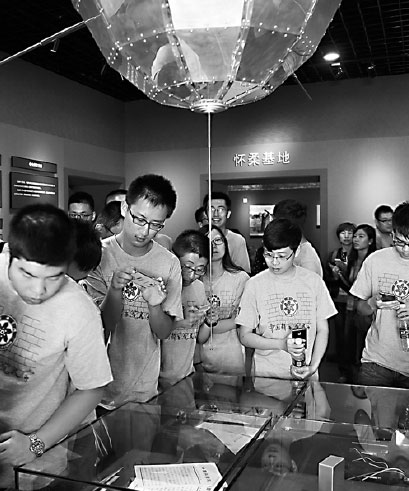Former mystery site celebrates nuclear past
Updated: 2015-09-14 07:58
By Cheng Yingqi(China Daily)
|
|||||||||||
An architectural complex that occupies 6,000 square meters on a mountainside in Beijing's Huairou district has long been a mystery for nearby residents.
Called the Beijing College of Mining & Technology, the facility wasn't for students. In fact, it was scientists who started moving in before the buildings were completed. Laboratory equipment delivered to the site was strictly guarded by soldiers.
Now, 61 years after China exploded its first atomic bomb, the Chinese Academy of Sciences has declassified the site - a secret rocket development center and laboratory where China's pioneering scientists once developed satellites and nuclear bombs.
"The bombs and satellites were significant milestones in our country's development and are the pride of the whole nation," said Cao Xiaoye, deputy secretary-general of the Chinese Academy of Sciences, at the opening ceremony of a new memorial hall on the old experimental site.
Since 1958, more than 17,000 researchers from the academy participated in the development of satellites and nuclear bombs. Many of their names were never disclosed, even after the success of China's first atomic bomb in 1964.
"To commemorate those scientists who contributed to the country's great success, the Chinese Academy of Sciences decided in 2013 to turn the old rocket facility into a memorial hall," Cao said.
Exhibitions inside the hall include experimental devices, photos and handwritten documents.
The site is now contained within the Huairou campus of the University of Chinese Academy of Sciences. The opening ceremony was one of the activities for the university's new school year.
The Huairou campus occupies some 71 hectares near Yanxi Lake, where the 21st Asia-Pacific Economic Cooperation forum was held in November. This school year marks the first semester since the campus zone was completed. It was the largest infrastructure project ever undertaken by the Chinese Academy of Sciences.
"Over the past 60 years, the Chinese Academy of Sciences has been leading China's scientific progress and has formed a unique higher education system integrating scientific research and education," said Bai Chunli, president of the academy.
"I hope each student at our university will carry forward the spirit of the old scientists who participated in the research of China's bombs and satellites - to incorporate your personal dreams into the Chinese Dream, the great rejuvenation of China," he said.
chengyingqi@chinadaily.com.cn
|
Students from the University of Chinese Academy of Sciences visit a memorial hall in Beijing on Saturday. The hall was a rocket base when the country began to develop its nuclear weapons in 1958. Jin Liwang / Xinhua |
(China Daily 09/14/2015 page5)
Today's Top News
British MPs reject assisted dying bill
Chinese nuclear plant may be built in UK sooner than planned
US to accept 10,000 Syrian refugees
China, Arab States to explore cooperation
Greek conservative to seek pact with leftists first if he wins election
Russian military experts present in Syria
Britain calls for talks to calm Northern Ireland crisis
Hungarian TV journalist fired for tripping up fleeing migrants
Hot Topics
Lunar probe , China growth forecasts, Emission rules get tougher, China seen through 'colored lens', International board,
Editor's Picks

|

|

|

|

|

|







